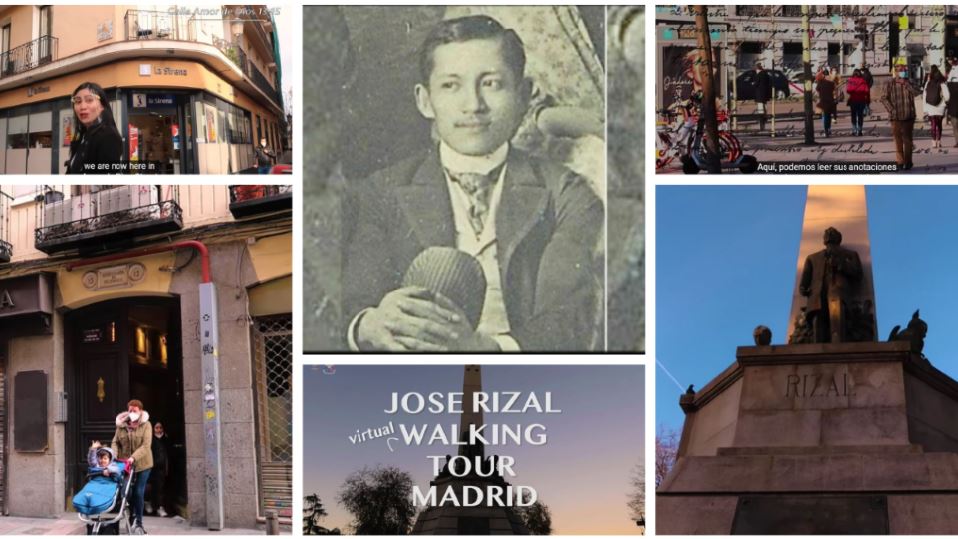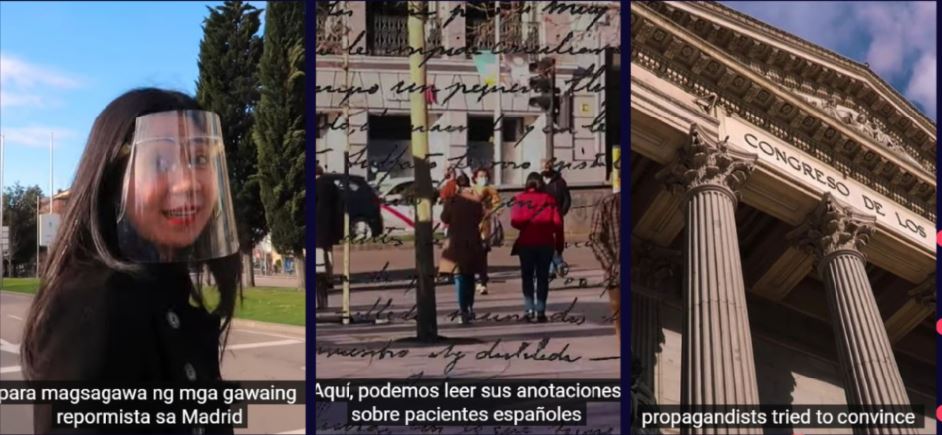
The first-ever Jose Rizal Virtual Walking Tour Madrid written and narrated by University of the Philippines (UP) historian Dr. Ros Costelo, produced by the Philippine Embassy in Spain under the leadership of Amb. Philippe Jones Lhuillier and the Philippines’ National Commission for Culture and the Arts (NCCA), is now available for viewing after being launched on March 6, 2021.
The virtual walking tour presented as a documentary runs for 33 minutes as it tells the story of the national hero from Calamba in Laguna, and traces his footsteps through the capital city of Spain to visit the 15 principal locations that made an impact on the Filipino’s life as he studied and campaigned for reforms in the Philippines during the Spanish colonial period.
The historical guide-writer on the video tour is Dr. Ros Costelo, the UP historian who recently made the headlines for receiving the mark of sobresaliente cum laude, the highest possible recognition that can be bestowed by the Spanish educational system when she graduated with a doctorate degree in Contemporary History from the Universidad Complutense de Madrid, Spain’s most prestigious academic institution which also gave Jose Rizal a sobresaliente mark in Philosophy and Letters.
Dr. Costelo speaks in Filipino as the screen flashes either English or Spanish translations as the video tour takes the viewer through the streets, theaters, restaurants, buildings, and schools that the 21-year-old Rizal frequented after he arrived in Madrid in 1882 until 1885 for studies. After visiting several other countries in Europe, the Filipino hero returned to Madrid from 1890-1891 to work with the reform movement. He eventually returned to the Philippines, saying the battle must be fought in the motherland and no longer in Spain.
Dr. Ros recounts the major historical junctures of Jose Rizal’s journey from being a student to being a leader in the reform movement to his eventual radicalization as he returned to the Philippines.
In between naming persons, organizations, and facts that are recorded in history books including the socio-economic and political situation of the Philippines as Rizal stayed in Europe, the guide narrates lesser-known facts about Jose Rizal’s relationships, observations of the places he visited, people he met, along with the struggles he faced in Europe and his development into a Filipino leader.

The walking tour narrative tells us of similarities in the experiences of Jose Rizal as a Filipino in 19th-century Spain and as a struggling student who worries about his family and countrymen in the Philippines – the backdrop of his eventually earning two degrees, one in Medicine and another in Philosophy and Letters.
The audience is given a peek into Rizal’s life as a student, the condition of the houses Rizal lived in, his many letters written between Rizal and his family, the care packages he received, the financial struggles he faced, worrying about the failing health of his parents, and a cholera epidemic that was spreading in his home country.
It tells stories of Rizal’s ideals as a reformist in Spain who wanted to improve the conditions in his home country, where he developed ideas over debates with fellow reformists, expressed his political opinions both in speech and writings, championed Filipino excellence, spoke against racism, and criticized the Spanish colonial government.
It also tells of Rizal’s frustration with other Filipinos who took to gambling and entertaining themselves and failing to make the most of their stay in Spain to help the Philippines and his concern over his family’s troubles.
The Jose Rizal Virtual Walking Tour wraps up with Dr. Ros Costelo stating how “Jose Rizal was a product of his time and society. It was during the spread of Liberalism when Rizal came to Spain. In the metropolis, the young Rizal was exposed to the liberal ideas of freedom, equal rights, and modernity.
“During his student years in Madrid, Rizal cultivated his intellectual, literary, artistic, and scientific pursuits. More importantly, he worked with other Filipinos and networked with progressive Spanish politicians to secure changes in the country. However, these reforms did not immediately reach the Philippines due to the many challenges that Spain faced in the last years of its empire.”
“In the Philippines, it signalled the movement leading to the eventual independence of the country. It has been almost a century and a half since Jose Rizal and his Filipino compatriots walked this city… The story of the Filipinos in Madrid goes on even now. Today, the city is home to a growing community of Filipinos. As time goes by, the lessons of history and the ideological legacy of Rizal remain as foundations of our nation-building. However, the challenge for us Filipinos remains- to follow in his footsteps so that we may pursue the path of progress as a nation.”
WATCH the video here and SHARE in the comments below, what did you like about the first-ever Jose Rizal Virtual Walking Tour Madrid narrated by University of the Philippines historian Dr. Ros Costelo?
Good News Pilipinas is celebrating its 15th Anniversary in 2021 by giving away prizes! Subscribe to our Good News Pilipinas! TV YouTube channel and enter the raffle by sending us an email to editor@goodnewspilipinas.com
The post WATCH: 1st-ever Jose Rizal Virtual Walking Tour Madrid guided by University of the Philippines historian appeared first on Good News Pilipinas.

0 Comments